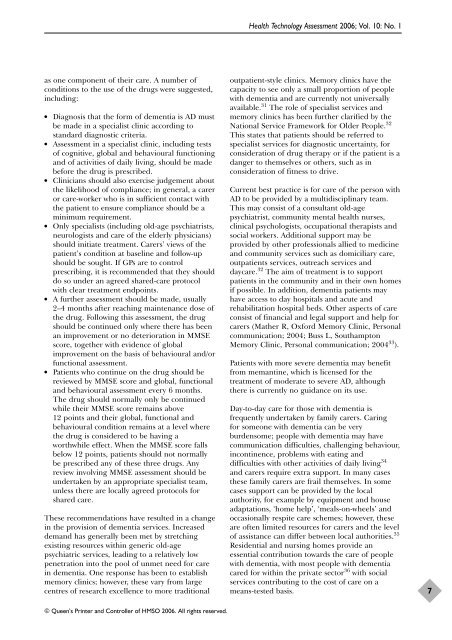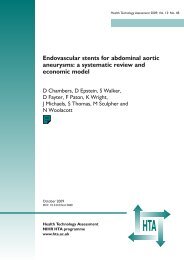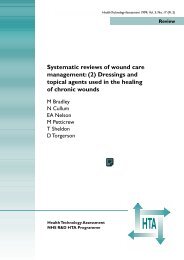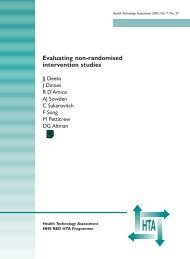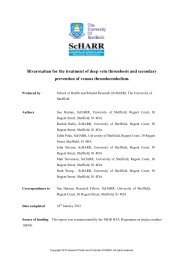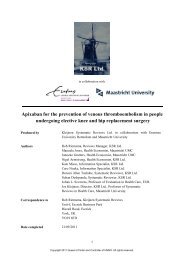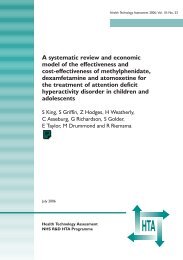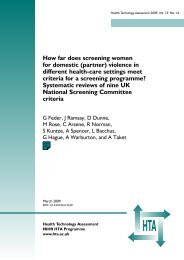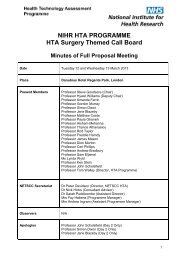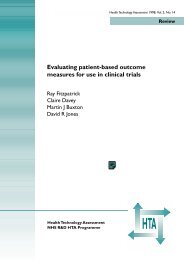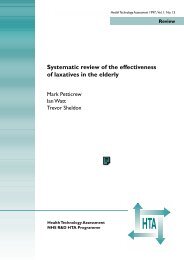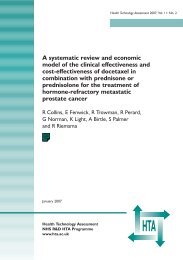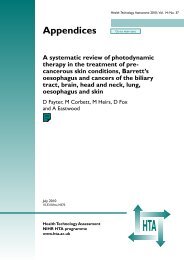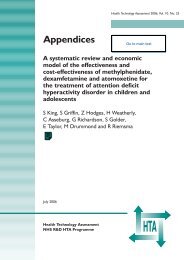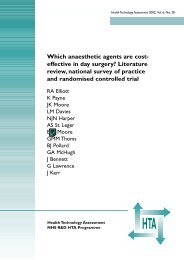Donepezil, rivastigmine, galantamine and memantine for ...
Donepezil, rivastigmine, galantamine and memantine for ...
Donepezil, rivastigmine, galantamine and memantine for ...
Create successful ePaper yourself
Turn your PDF publications into a flip-book with our unique Google optimized e-Paper software.
as one component of their care. A number of<br />
conditions to the use of the drugs were suggested,<br />
including:<br />
● Diagnosis that the <strong>for</strong>m of dementia is AD must<br />
be made in a specialist clinic according to<br />
st<strong>and</strong>ard diagnostic criteria.<br />
● Assessment in a specialist clinic, including tests<br />
of cognitive, global <strong>and</strong> behavioural functioning<br />
<strong>and</strong> of activities of daily living, should be made<br />
be<strong>for</strong>e the drug is prescribed.<br />
● Clinicians should also exercise judgement about<br />
the likelihood of compliance; in general, a carer<br />
or care-worker who is in sufficient contact with<br />
the patient to ensure compliance should be a<br />
minimum requirement.<br />
● Only specialists (including old-age psychiatrists,<br />
neurologists <strong>and</strong> care of the elderly physicians)<br />
should initiate treatment. Carers’ views of the<br />
patient’s condition at baseline <strong>and</strong> follow-up<br />
should be sought. If GPs are to control<br />
prescribing, it is recommended that they should<br />
do so under an agreed shared-care protocol<br />
with clear treatment endpoints.<br />
● A further assessment should be made, usually<br />
2–4 months after reaching maintenance dose of<br />
the drug. Following this assessment, the drug<br />
should be continued only where there has been<br />
an improvement or no deterioration in MMSE<br />
score, together with evidence of global<br />
improvement on the basis of behavioural <strong>and</strong>/or<br />
functional assessment.<br />
● Patients who continue on the drug should be<br />
reviewed by MMSE score <strong>and</strong> global, functional<br />
<strong>and</strong> behavioural assessment every 6 months.<br />
The drug should normally only be continued<br />
while their MMSE score remains above<br />
12 points <strong>and</strong> their global, functional <strong>and</strong><br />
behavioural condition remains at a level where<br />
the drug is considered to be having a<br />
worthwhile effect. When the MMSE score falls<br />
below 12 points, patients should not normally<br />
be prescribed any of these three drugs. Any<br />
review involving MMSE assessment should be<br />
undertaken by an appropriate specialist team,<br />
unless there are locally agreed protocols <strong>for</strong><br />
shared care.<br />
These recommendations have resulted in a change<br />
in the provision of dementia services. Increased<br />
dem<strong>and</strong> has generally been met by stretching<br />
existing resources within generic old-age<br />
psychiatric services, leading to a relatively low<br />
penetration into the pool of unmet need <strong>for</strong> care<br />
in dementia. One response has been to establish<br />
memory clinics; however, these vary from large<br />
centres of research excellence to more traditional<br />
© Queen’s Printer <strong>and</strong> Controller of HMSO 2006. All rights reserved.<br />
Health Technology Assessment 2006; Vol. 10: No. 1<br />
outpatient-style clinics. Memory clinics have the<br />
capacity to see only a small proportion of people<br />
with dementia <strong>and</strong> are currently not universally<br />
available. 31 The role of specialist services <strong>and</strong><br />
memory clinics has been further clarified by the<br />
National Service Framework <strong>for</strong> Older People. 32<br />
This states that patients should be referred to<br />
specialist services <strong>for</strong> diagnostic uncertainty, <strong>for</strong><br />
consideration of drug therapy or if the patient is a<br />
danger to themselves or others, such as in<br />
consideration of fitness to drive.<br />
Current best practice is <strong>for</strong> care of the person with<br />
AD to be provided by a multidisciplinary team.<br />
This may consist of a consultant old-age<br />
psychiatrist, community mental health nurses,<br />
clinical psychologists, occupational therapists <strong>and</strong><br />
social workers. Additional support may be<br />
provided by other professionals allied to medicine<br />
<strong>and</strong> community services such as domiciliary care,<br />
outpatients services, outreach services <strong>and</strong><br />
daycare. 32 The aim of treatment is to support<br />
patients in the community <strong>and</strong> in their own homes<br />
if possible. In addition, dementia patients may<br />
have access to day hospitals <strong>and</strong> acute <strong>and</strong><br />
rehabilitation hospital beds. Other aspects of care<br />
consist of financial <strong>and</strong> legal support <strong>and</strong> help <strong>for</strong><br />
carers (Mather R, Ox<strong>for</strong>d Memory Clinic, Personal<br />
communication; 2004; Buss L, Southampton<br />
Memory Clinic, Personal communication; 2004 33 ).<br />
Patients with more severe dementia may benefit<br />
from <strong>memantine</strong>, which is licensed <strong>for</strong> the<br />
treatment of moderate to severe AD, although<br />
there is currently no guidance on its use.<br />
Day-to-day care <strong>for</strong> those with dementia is<br />
frequently undertaken by family carers. Caring<br />
<strong>for</strong> someone with dementia can be very<br />
burdensome; people with dementia may have<br />
communication difficulties, challenging behaviour,<br />
incontinence, problems with eating <strong>and</strong><br />
difficulties with other activities of daily living 34<br />
<strong>and</strong> carers require extra support. In many cases<br />
these family carers are frail themselves. In some<br />
cases support can be provided by the local<br />
authority, <strong>for</strong> example by equipment <strong>and</strong> house<br />
adaptations, ‘home help’, ‘meals-on-wheels’ <strong>and</strong><br />
occasionally respite care schemes; however, these<br />
are often limited resources <strong>for</strong> carers <strong>and</strong> the level<br />
of assistance can differ between local authorities. 35<br />
Residential <strong>and</strong> nursing homes provide an<br />
essential contribution towards the care of people<br />
with dementia, with most people with dementia<br />
cared <strong>for</strong> within the private sector 36 with social<br />
services contributing to the cost of care on a<br />
means-tested basis.<br />
7


